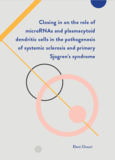Closing in on the role of microRNAs and plasmacytoid dendritic cells in the pathogenesis of systemic sclerosis and primary Sjogren’s syndrome

Chouri, Eleni
- Promoter:
- Prof.dr. T.R.D.J. (Timothy) Radstake
- Co-promoter:
- Dr. M. (Marzia) Rossato & dr. J.A.G. (Joel) van Roon
- Research group:
- Radstake
- Date:
- May 23, 2019
- Time:
- 12:45 h
Summary
Systemic sclerosis (SSc) and primary Sjogren’s syndrome (pSS) are autoimmune diseases for which no effective therapy is currently available. Even though these diseases have different clinical manifestations, they share several immunopathological features. The activation of innate and adaptive immunity is evident in both SSc and pSS and they are characterized by type I interferon (IFN) signature. Plasmacytoid dendritic cells (pDCs), which are the main producers of IFN, are decreased in circulation in both autoimmune diseases, whereas they are increased in affected tissues. To this end, we investigated the molecular alterations at the transcriptomic level present in pDCs of SSc patients. Additionally, this thesis aimed to investigate the role of microRNAs as epigenetic key regulators of gene expression in pDCs and circulation of SSc and pSS. This thesis pinpointed altered molecular signature (transcriptome and miRNome) in pDCs of SSc patients, identifying several pathways to be dysregulated. We further showed IGF2 to be increased in pDCs of SSc, a gene known to be regulated by its intronic microRNA, miR-483-5p. Here, we demonstrated that miR-483-5p was increased in serum of SSc patients already at early SSc stages and possibly associated with fibrosis. Furthermore, this work demonstrated miRNA dysregulation in pDCs of pSS, showing miR-29a and miR-29c to be decreased, linked to apoptosis and likely associated with pDC survival in patients. Overall, this thesis proposed that the function of miRNAs and pDCs is impaired in SSc and pSS. These results shed light on novel potential mechanisms causing disease indicating possible targets for therapeutic intervention.